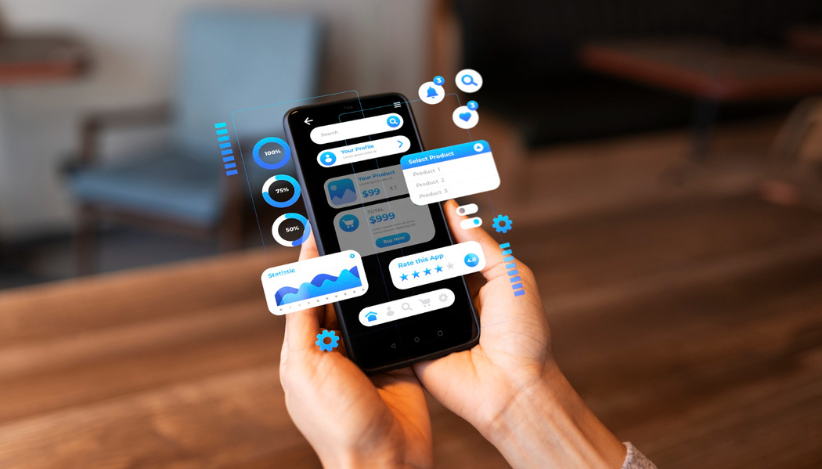
Introduction
In today’s fast-paced digital world, businesses are constantly looking for ways to stay ahead and connect with customers effectively. Artificial Intelligence (AI) is a game-changing technology that is transforming how companies operate and engage with their audiences. The most powerful tool for this transformation? Mobile apps.
AI is making mobile apps smarter, enabling businesses to personalize experiences, streamline operations, and make data-driven decisions. It’s not just about improving customer service; it’s reshaping industries like retail, healthcare, finance, and education.
How is AI in mobile apps reshaping the business landscape? In this article, we’ll explore its impact on customer engagement, efficiency, and decision-making, and how businesses of all sizes can benefit from this shift.
The Growing Role of AI in Business-Centric Mobile Apps
Imagine a world where your mobile app understands your customer’s needs before they do, automates tasks, and provides real-time insights to drive smarter decisions. This is the power of AI in business-centric mobile apps, and it’s becoming a game-changer across industries.
AI is no longer just a buzzword; it is the engine propelling mobile apps forward.
Businesses are using AI to create apps that are more personalized, efficient, and data-driven. As customer expectations rise, mobile apps need to be smarter, faster, and more intuitive. AI is helping businesses offer personalized content, automate support, and predict trends, making it an essential tool for improving customer engagement, simplifying operations, and driving growth.
How AI-Powered Mobile Apps Are Transforming Businesses
AI in mobile apps offers numerous advantages for businesses across various sectors. Some of the most significant impacts of AI-powered apps are seen in the following areas:
1. Enhancing Customer Engagement and Personalization
AI-powered mobile apps can gather and analyze user data to create highly personalized experiences, such as recommending content, suggesting products, and offering customized services. By predicting what users prefer and how they behave, AI helps businesses provide relevant and engaging interactions that build customer loyalty and satisfaction. Machine learning (ML) algorithms process large amounts of data in real-time, allowing businesses to meet individual needs and foresee future actions.
2. Improving Operational Efficiency and Automation
Mobile apps with AI can automate many tasks, from administrative work to customer support, helping businesses save time and reduce human error. AI algorithms can take care of repetitive tasks like data entry, scheduling appointments, and managing inventory, allowing employees to focus on more important work. In industries like retail and manufacturing, AI-powered apps improve inventory management, predict when maintenance is needed, and optimize the supply chain.
3. Revolutionizing Data-Driven Decision-Making
AI helps businesses gather valuable insights from large amounts of data, allowing leaders to make better decisions. With tools like predictive analytics, machine learning, and natural language processing (NLP), AI-powered mobile apps help businesses spot trends, understand customer preferences, and find new market opportunities. This leads to smarter decision-making and allows businesses to act ahead of time, instead of just reacting.
For example, an online store can use AI to recommend products based on past purchases, increasing sales. It can also predict trends, allowing the store to restock in advance and avoid running out of inventory.
4. Enabling Smart Marketing and Sales Strategies
AI improves marketing and sales by analyzing customer data, tracking buying habits, and predicting future trends. AI-powered mobile apps can make marketing campaigns more effective by targeting the right audience with personalized content, messages, and offers. They also help with lead scoring, predicting sales, and segmenting customers, making it easier for businesses to increase conversion rates and drive growth.
Key AI Technologies Driving Business Innovation
AI-powered mobile apps incorporate a variety of technologies that help businesses operate more efficiently and effectively. Some of the key AI technologies driving business innovation include:
1. Machine Learning for Business Insights
Machine learning for business insights involves using algorithms to analyze large sets of data and uncover patterns, trends, and predictions. This helps businesses make data-driven decisions, identify opportunities, improve customer experiences, and optimize processes, ultimately driving growth and enhancing efficiency by providing valuable, actionable insights in real time.
2. Natural Language Processing (NLP) for Better Customer Interaction
NLP allows mobile apps to understand, process, and respond to human language in a meaningful way. It powers voice assistants, chatbots, and automated customer support systems, allowing businesses to engage with customers more naturally. This results in improved customer satisfaction, faster response times, and enhanced user experience.
3. AI-Powered Chatbots and Virtual Assistants
Chatbots and virtual assistants equipped with AI technologies are transforming customer support and service. By leveraging NLP and machine learning, these tools can provide quick and efficient answers to customer queries, reducing wait times and improving overall satisfaction. In addition, they help businesses scale their customer support operations with minimal resources.
4. Computer Vision for Security and Retail Applications
Computer vision, powered by AI, allows mobile apps to analyze and understand visual data. In security, AI-enabled apps can spot potential threats using facial recognition and detecting unusual behavior. In retail, computer vision helps businesses improve the shopping experience by providing features like visual search, augmented reality, and virtual try-ons.
Industry-Specific Impact of AI in Mobile Apps
AI-powered mobile apps are driving major changes across industries, transforming business operations, customer engagement, and value generation. Here are some real-world examples of how AI is being applied in key sectors:
1. E-Commerce:
- Personalized Shopping Experience: AI enhances the shopping experience by analyzing customer preferences, past purchases, and browsing behaviour to recommend personalized products. For example, Amazon uses AI to suggest products based on previous searches and purchases, helping customers discover items they’re likely to buy, increasing satisfaction and sales.
- Chatbots for Customer Support: AI-powered chatbots in e-commerce assist customers by providing product recommendations, tracking orders, and managing returns. These chatbots offer quick, personalized support 24/7, improving customer satisfaction and creating a seamless shopping experience.
- Smart Search: Smart search in e-commerce uses AI to better understand user queries, providing relevant results. For example, a search for “leather jacket” can show options based on color, style, and previous purchases, enhancing accuracy.
2. Healthcare:
- Telemedicine and Virtual Consultations: AI-powered apps enable remote diagnoses and treatment by analyzing patient data and providing doctors with valuable insights during video consultations. These apps connect patients with doctors and specialists remotely, improving access to healthcare and making it more efficient.
- Remote Patient Monitoring: AI tracks patient vitals in real-time, enabling proactive health management.
- Medical Image Analysis: Using AI for medical image analysis allows doctors to detect conditions like tumors and fractures more accurately. By processing images with high precision, it enhances diagnosis, leading to better treatment and improved patient outcomes.
3. Finance and Banking:
- Fraud Detection: AI-powered fraud detection in finance analyzes transaction patterns to identify suspicious activity. For example, banks use AI to flag unusual transactions, such as large withdrawals, helping prevent fraudulent actions and protect accounts.
- Robo-Advisors: This offers personalized financial guidance based on individual goals and risk tolerance. For example, platforms like Betterment use AI to suggest tailored investment strategies, helping users manage their portfolios efficiently.
- Loan Underwriting: AI can assess creditworthiness and streamline the loan approval process by analyzing financial data.
4. Retail:
- Smart Inventory Management: AI helps retailers like Walmart optimize inventory levels by tracking stock in real time, ensuring products are always available without overstocking.
- Customer Behavior Analysis: AI analyzes customer shopping patterns, including browsing history and past purchases, to predict future needs. This helps businesses optimize product placement, offer personalized recommendations, and improve inventory management, boosting sales and satisfaction.
5. Education:
- Personalized Learning: AI-powered apps, such as Duolingo, adjust lessons based on how students progress and their learning preferences, making the experience more personalized and suited to each learner’s needs.
- Smart Grading Systems: AI-powered smart grading systems benefit both students and educators. For students, they provide instant feedback, personalized suggestions, and faster progress tracking, helping them improve quickly. For educators, AI saves time by automating grading, enabling them to focus more on teaching, while ensuring consistent and accurate evaluations.
- Tutoring Assistants: AI-driven tutoring assistants offer personalized help by adjusting lessons based on a student’s needs. For example, an AI tutor can guide students through challenging topics and provide practice to improve their skills.
6. Real Estate:
- Virtual Property Tours: AI-powered apps allow potential buyers to explore homes remotely. For example, real estate platforms use AI to create interactive 3D tours, enabling buyers to view properties in detail without visiting in person.
- Price Prediction: AI analyzes market trends and property data to predict real estate prices, helping investors make informed decisions. For example, AI tools can predict future property values based on factors like location, demand, and economic conditions, assisting investors in making smarter investment choices.
7. Manufacturing:
- Predictive Maintenance: AI apps monitor equipment health and predict when maintenance is required, reducing downtime. For example, AI can detect early signs of wear in machinery, allowing companies to schedule repairs before breakdowns occur, minimizing downtime.
- Smart Factory Automation: AI-powered smart factory automation systems enhance production by automating tasks such as quality control and assembly. These systems track equipment performance and adjust processes in real-time, improving efficiency and reducing costs.
8. Transportation & Logistics:
- AI for Route Optimization AI apps analyze traffic and weather data to suggest the most efficient routes for drivers. Delivery services like Uber Eats and FedEx use this technology to help drivers navigate efficiently, reducing delivery times.
- Autonomous Vehicles: AI powers self-driving vehicles, transforming the transportation industry by enhancing safety and reducing human error. Companies like Tesla use AI to power self-driving cars, improving safety and shaping the future of transportation.
Challenges and Considerations in AI-Integrated Mobile Apps
While AI offers numerous benefits, businesses face several challenges when integrating AI into mobile apps. Some of the key challenges include:







Partner with iTech for Cutting-Edge AI-Powered Mobile App Development
Is your mobile app ready for the future? At iTech, we integrate advanced AI technologies like machine learning, NLP, and predictive analytics to create highly intuitive apps that drive business success. Whether you’re enhancing customer engagement or optimizing operations, we’ll work with you to build an app that delivers real value and sets you apart from the competition.
Step into the future with AI-powered apps! Contact iTech now and transform the way you do business.









